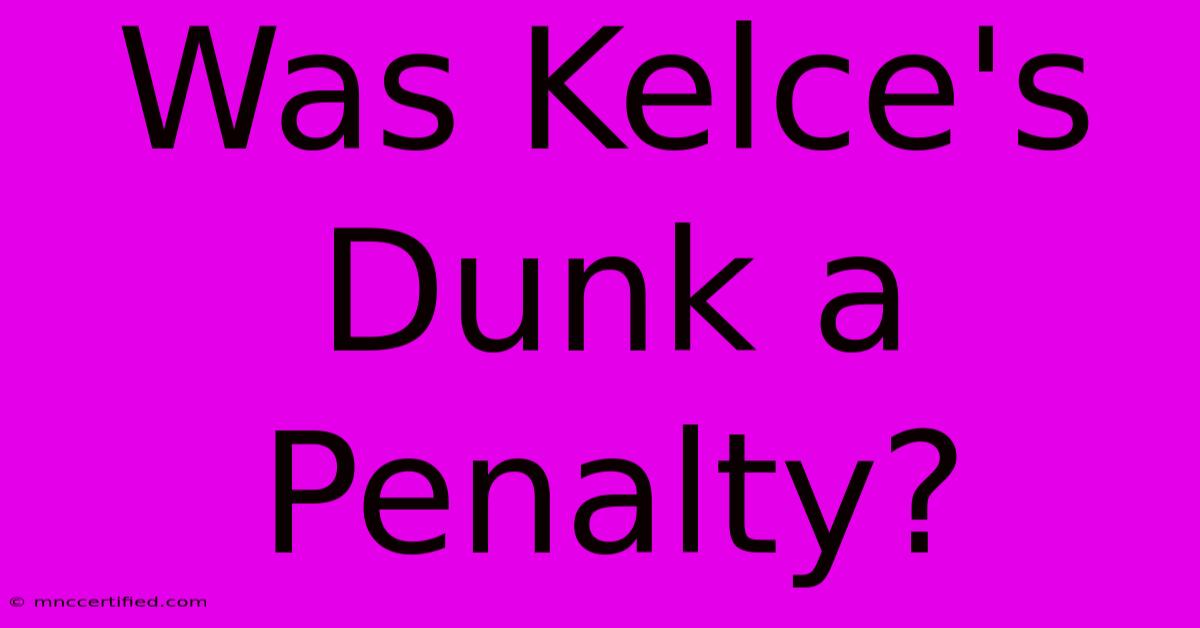Was Kelce's Dunk A Penalty?

Table of Contents
Was Kelce's Dunk a Penalty? Unpacking the NFL's Controversial Celebration
The NFL is a game of inches, strategy, and sometimes, highly debated celebrations. Travis Kelce's now-infamous dunk after scoring a touchdown in Super Bowl LVII sparked a firestorm of controversy, leaving fans and analysts questioning: was Kelce's dunk actually a penalty? Let's delve into the rules, the incident, and the ongoing debate.
Understanding the NFL's Rules on Celebrations
The NFL's rulebook, specifically Rule 12, Section 3, Article 1(a), addresses unsportsmanlike conduct. It states that players cannot engage in excessive celebrations, which are defined as actions deemed taunting, obscene, or demonstrative. The key word here is "excessive." The line between a celebratory expression of joy and a penalty-worthy display is often blurry, leading to subjective interpretations. Referees are tasked with making these difficult calls in real-time, often under immense pressure.
The Key Factors in Determining a Penalty
Several factors contribute to the referee's decision on whether a celebration constitutes a penalty:
- Duration: A prolonged or overly elaborate celebration is more likely to be flagged.
- Location: Celebrations directed at opponents or involving props can be considered unsportsmanlike.
- Intent: Was the celebration intended to taunt or disrespect the opposing team? This is a crucial, though often difficult-to-prove, element.
- Player History: A player with a history of excessive celebrations might face stricter enforcement.
Analyzing Kelce's Dunk: Penalty or Not?
Kelce's dunk, while undeniably exuberant, presented a complex scenario for the officials. Was it excessive? Arguably, it was a fairly standard touchdown celebration, albeit one with a high degree of athleticism. It lacked overt taunting or disrespect towards the Eagles. The key argument against a penalty is the lack of prolonged celebration or overt showboating. He celebrated quickly and efficiently, then got back to the game.
Arguments For and Against a Penalty
Arguments for a penalty: Some argue that the dunk itself, given its proximity to the opposing team's sideline, could be considered provocative, even without explicit taunting. The argument is that the visual display might be interpreted negatively by the opponent and could spark unnecessary conflict.
Arguments against a penalty: Many believe the celebration was simply a natural, spontaneous outburst of joy following a significant score in the Super Bowl. The lack of overt taunting and the relatively short duration of the celebration support this view. The absence of any overt negative reactions from the Eagles also adds weight to this argument.
The Impact of Subjectivity and Referee Discretion
The reality is that the application of the NFL's celebration rules is often subjective. Referees have considerable discretion, and their decisions can be influenced by various factors. This inherent subjectivity contributes to the ongoing debate surrounding calls like Kelce's dunk. This inconsistency in enforcement across different games and referees fuels the constant discussion and, sometimes, the outrage from fans and commentators.
Conclusion: A Question of Interpretation
Ultimately, whether Kelce's dunk was a penalty comes down to interpretation. There was no clear violation of the letter of the rule, but the spirit of the rule remains open to interpretation. The lack of a penalty suggests the officials deemed it within the bounds of acceptable celebration. However, the controversy highlights the need for greater clarity and consistency in the enforcement of celebration rules within the NFL to avoid future debates and ensure fairness for all players and teams. This ongoing discussion underscores the ever-evolving landscape of rules and their interpretation within the exciting world of professional football.

Thank you for visiting our website wich cover about Was Kelce's Dunk A Penalty?. We hope the information provided has been useful to you. Feel free to contact us if you have any questions or need further assistance. See you next time and dont miss to bookmark.
Featured Posts
-
Doctor Who Christmas Special Joy
Dec 26, 2024
-
Taylor Swift Steelers Game Absence
Dec 26, 2024
-
Chiefs Vs Steelers Worthys Td
Dec 26, 2024
-
Elton Johns Christmas Tiny Dancer
Dec 26, 2024
-
Worthy Td Chiefs Beat Steelers
Dec 26, 2024